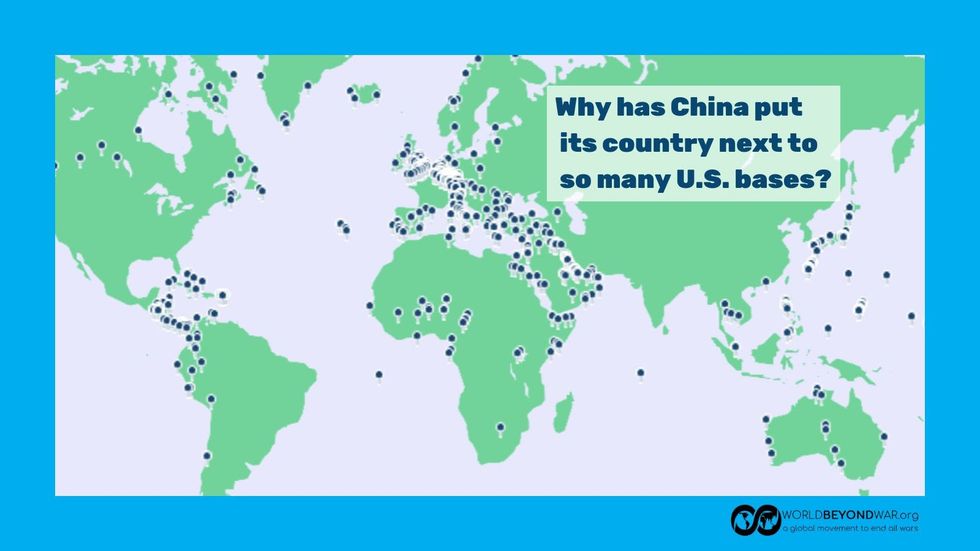On the few occasions when a government moves toward converting property or weapon production facilities into something useful for human beings, I can’t restrain a tumbling brainstorm: What if this signals a trend, what if practical problem-solving begins to trump reckless war preparation? And so, when Spain’s Prime Minister Pedro Sanchez announced on April 26 that his government will build 20,000 homes for social housing on land owned by the country’s Ministry of Defense, I immediately thought about crowded refugee camps around the world and inhumane treatment of people without homes. Visualize the vast capacity to welcome people into decent housing and promising futures if space, energy, ingenuity, and funds were diverted from the Pentagon to meet human needs.
We need glimmers of imagination about the worldwide potential for accomplishing good results by choosing the “works of mercy” over “the works of war.” Why not brainstorm about how resources devoted to military goals of domination and destruction could be put to use defending people against the greatest threats we all face—the looming terror of ecological collapse, the ongoing potential for new pandemics, the proliferation of nuclear weapons and threats to use them?
But a crucial first step entails fact-based education about the global infrastructure of the American military empire. What is the cost of maintaining each base, how much environmental damage does each base cause (consider depleted uranium poison, water contamination, noise pollution, and risks of nuclear weapon storage). We also need analysis about ways the bases exacerbate the likelihood of war and prolong the vicious spirals of violence attendant on all wars. How does the U.S. military justify the base, and what is the human rights record of the government the U.S. negotiated with to build the base?
The unique concept shows all U.S. bases along with their negative impacts in one database that is easy to navigate. This allows people to grasp the intensifying toll of U.S. militarism, and also provides information useful for taking action to close bases.
Tom Engelhardt, editor of Tom Dispatch, notes the paucity of discussion about the expanse of U.S. military bases, some of which he calls MIA because the U.S. military manipulates information and neglects to even name various forwarding operating bases. With very little oversight or discussion on the subject domestically, Engelhardt warns that the “massive (and massively expensive) base structure remains firmly in place.”
Thanks to the tenacious work of researchers who formed the No Bases campaign, World Beyond War (WBW) now presents the many-faced hydra of U.S. militarism, worldwide, in a visual database.
Why has China put its country next to so many U.S. bases
 Why has China put its country next to so many U.S. bases(worldbeyondwar)
Why has China put its country next to so many U.S. bases(worldbeyondwar)
Researchers, scholars, journalists, students, and activists can consult this tool for help in exploring vital questions about the cost and impact of the bases.
It’s a unique and challenging resource.
At the helm of daily exploration enabling the mapping project’s growth is Mohammad Abunahel.
On almost any given day in Abunahel’s busy life, he sets aside time, far more than he is compensated for, to work on the mapping project. He and his wife are both Ph.D. students in Mysore, India. They share caring for their infant son, Munir. He takes care of the baby while she studies, and then they trade roles. For years, Abunahel has devoted skill and energy to create a map which now draws the most “hits” of any section on the WBW website. He considers the map as a step in addressing wider problems of militarism. The unique concept shows all U.S. bases along with their negative impacts in one database that is easy to navigate. This allows people to grasp the intensifying toll of U.S. militarism, and also provides information useful for taking action to close bases.
Abunahel has good reason to resist military dominance and the threats of destroying cities and towns with overwhelming weaponry. He grew up in Gaza. Throughout his young life, before he finally managed to obtain visas and scholarships to study in India, he experienced constant violence and deprivation. As one of ten children in an impoverished family, he readily applied himself in classroom studies, hoping to improve his chances for a normal life, but, along with the constant threats of Israeli military violence, Abunahel faced closed doors, dwindling options, and rising anger, his own and that of most other people he knew. He wanted out. Having lived through successive Israeli Occupation Force onslaughts that killed and maimed hundreds of innocent people of Gaza, including children, and destroyed homes, schools, roadways, electrical infrastructure, fisheries, and farms, Abunahel grew certain that no country has a right to destroy another.
He's also adamant about our collective responsibility to question justifications for the U.S. network of military bases. Abunahel rejects the notion that the bases are necessary to protect U.S. people. He sees clear patterns showing the base network being used to impose U.S. national interests on people in other countries. The threat is clear: If you do not submit yourselves to fulfill U.S. national interests, the United States could eliminate you. And if you don’t believe this, look at other countries that were surrounded by U.S. bases. Consider Iraq, or Afghanistan.
David Swanson, the executive director of World Beyond War, reviewing David Vine’s book, The United States of War, notes that “since the 1950s, a U.S. military presence has correlated with the U.S. military starting conflicts. Vine modifies a line from Field of Dreams to refer not to a baseball field but to bases: ‘If you build them, wars will come.’ Vine also chronicles countless examples of wars begetting bases begetting wars begetting bases that not only beget yet more wars but also serve to justify the expense of more weapons and troops to fill the bases, while simultaneously producing blowback—all of which factors build momentum toward more wars.”
Illustrating the extent of the USA’s network of military outposts deserves support. Calling attention to the WBW website and using it to help resist all wars are vital ways to expand the potential for expanding and organizing resistance to U.S. militarism. WBW will also welcome financial contributions to assist Mohammad Abunahel and his wife who are, by the way, excitedly awaiting the birth of their second child. WBW would like to increase the small income he earns. It will be a way to support his growing family as he raises our awareness of warmaking and our resolve to build a world beyond war.


 Why has China put its country next to so many U.S. bases(worldbeyondwar)
Why has China put its country next to so many U.S. bases(worldbeyondwar)